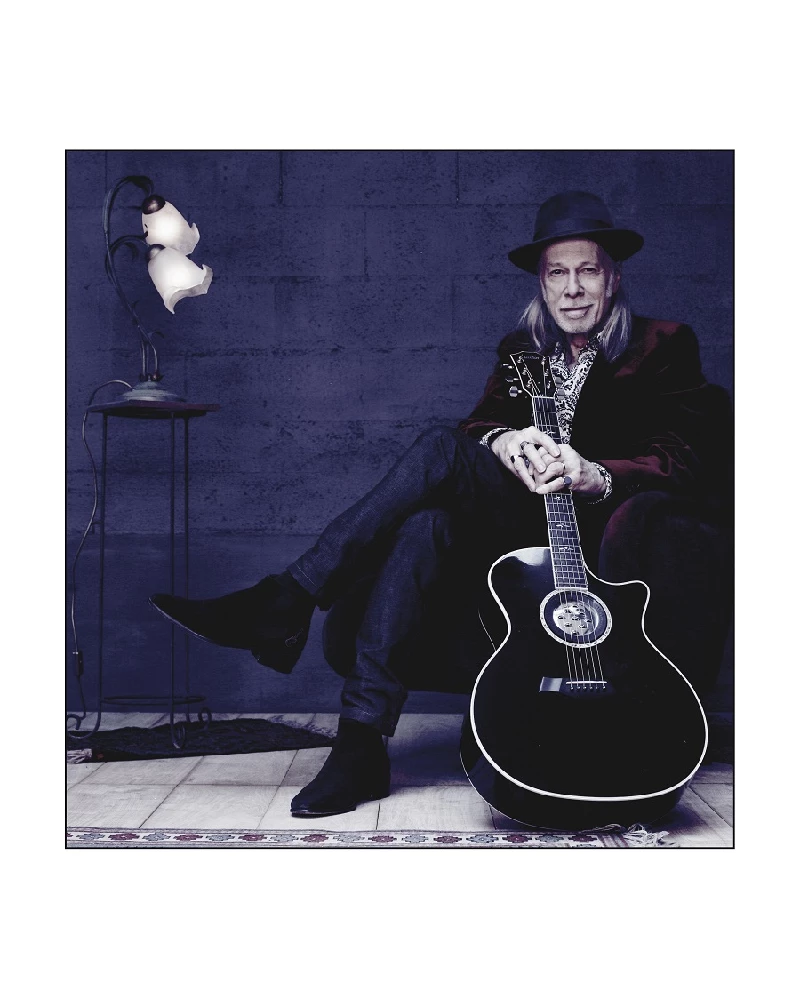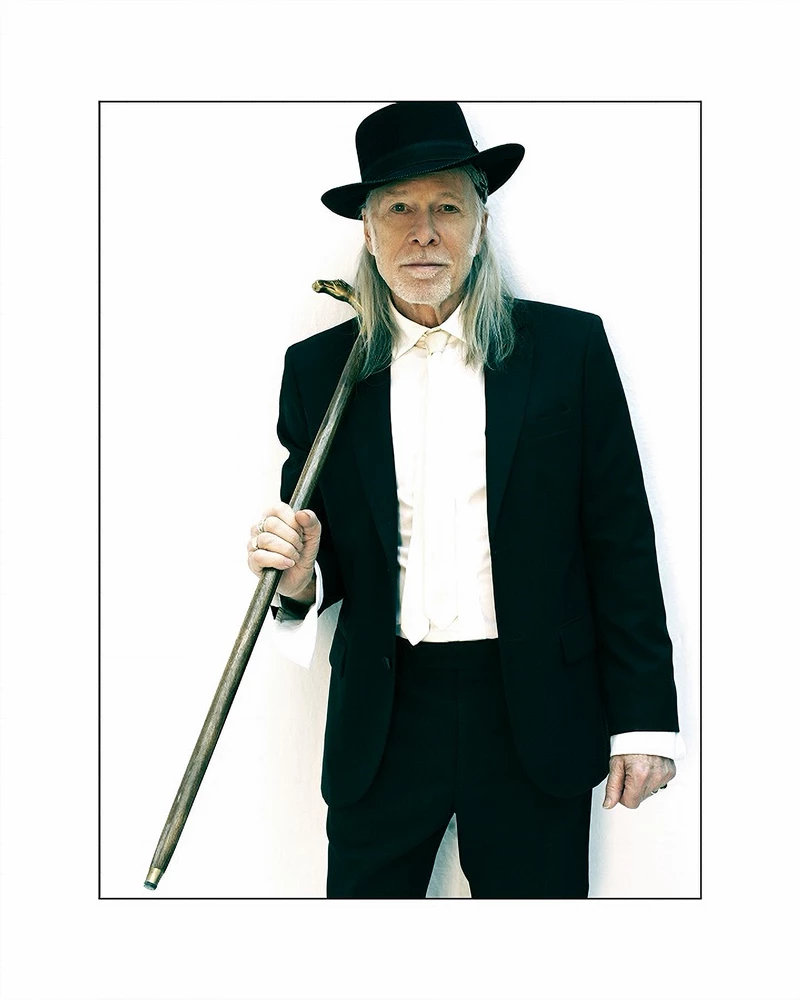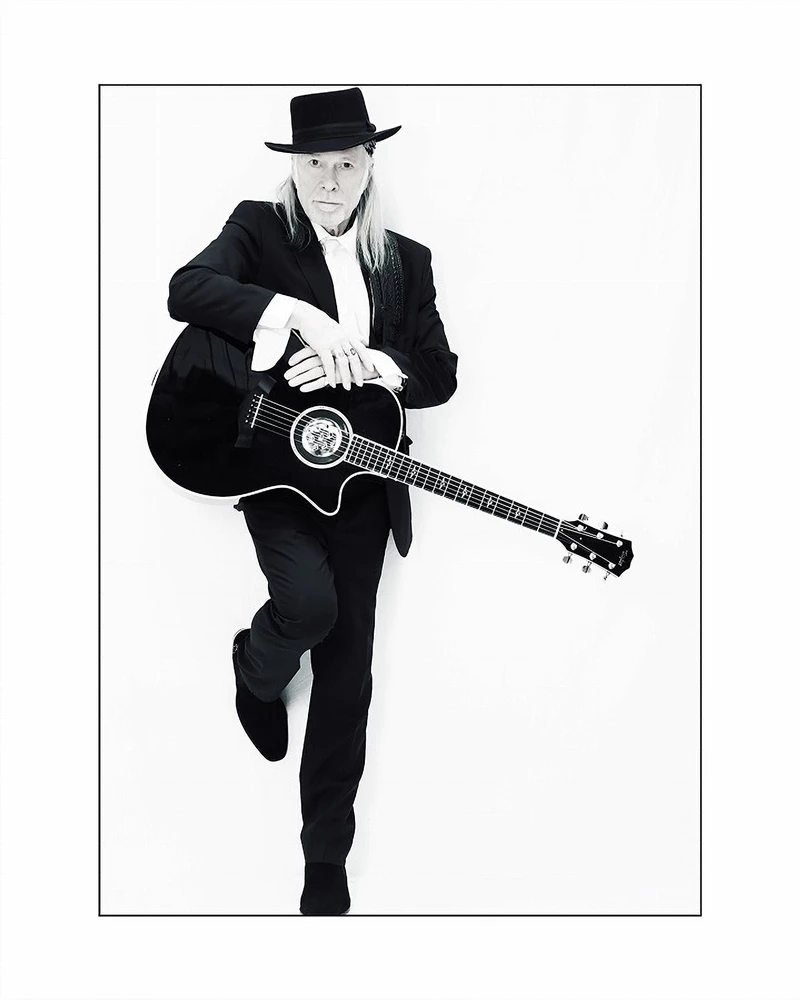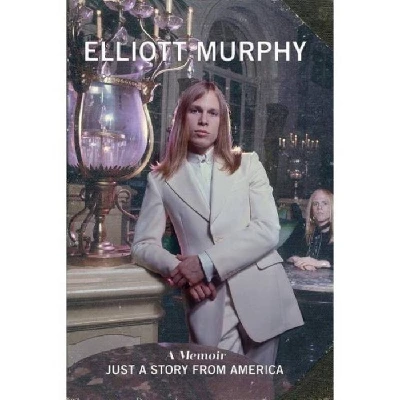Elliott Murphy - Interview
by Lisa Torem
published: 1 / 2 / 2025

intro
Header: Singer-songwriter Elliott Murphy is celebrating “50 years on the road” with a brand, new single, ‘Old-Timer.’ He catches up with Lisa Torem to talk about his career highlights.
Singer-songwriter Elliott Murphy’s celebratory single, ‘Old-Timer’ speaks volumes about growing old gracefully, while sustaining a sense of wonder. The self-ascribed, American ‘rock ‘n’ roller,’ who made Paris his home 35 years ago built up a loyal, international fan base across the European Continent. In an exclusive interview, this prolific, cross-cultural artist discusses touring, songwriting and “50 years on the road.” PB: First of all, happy birthday, Elliott! You have enjoyed a successful career as a singer/songwriter in both Paris and the U.S. Please share any standout moments or challenges that have occurred over the years. EM: Thanks so much Lisa. These last few years have been very celebratory in nature as I passed two so-called milestones, the most recent being turning seventy-five in March. Family, friends, and fans created quite a lot of hoopla around it, although for me, I couldn’t grasp its profound importance as much as those near and dear to me did. More importantly, I was celebrating “50 years on the road” as a professional singer-songwriter and a modern troubadour (if such a thing exists), the year before. That was an achievement which required tenacity, struggle, and a bit of courage. Getting older happens whether you like it or not, As you can imagine, there have been many memorable moments during all that time, both in my life and in my career in music. I still have to say that the first time I ever heard a song of mine on the radio was when a dream became reality and that was in 1973 after the release of ‘Aquashow’ (my first album) and New York FM radio stations started playing ‘Last of the Rock Stars’ regularly. That was the pivotal moment when I knew I was about to begin a journey down the rock ‘n’ roll river which finally led me here to Paris where I’ve lived these past thirty-five years. Another of my extensive list of “unforgettables” was when I played my first show in Paris in 1979 and standing on the stage of Le Palace Theater, I knew there would be a second act to my career after the American music business left me high and dry. I guess my greatest challenge has been learning to function as an independent artist which began in the 1980’s, producing my own albums, licensing them all over the world and organizing tours in Europe and Japan. I really didn’t know if I would be able to sustain that kind of business model but lo and behold, here I am, still doing it. PB: What is it about the atmosphere of the New Morning Club in Paris that inspired you to write ‘Old Timer’? EM: The New Morning is a legendary Jazz, Blues and sometimes Rock club that has become an institution in Paris with an incredible musical legacy. When Prince was looking for a spot to jam after finishing a sold-out arena concert some years ago here in Paris, he chose New Morning and he performed until four in the morning. Both Nina Simone and Chet Baker played New Morning many times, but I might hold the distinction of having played there more times than any other artist. My “Birthday Shows” began about twenty years ago and it’s always a mind-blowing experience as fans come from all over Europe, the USA and even Japan to be among the packed audience. I found this year to be especially moving when I looked out and saw the familiar faces of fans I’ve known for years and I really felt like a rock ‘n’ roll survivor (which became part of the chorus of ‘Old Timer’) and that just standing on that stage at seventy-five was something to be proud of, which became another line from the song. PB: ‘Old Timer’ reminded me of a few classics (written in first-person) that speak to looking back over the years: ‘Hello in There’ (John Prine), ‘Where or When’ (Rodgers/Hart), ‘It Was a Very Good Year’ (Ervin Drake) and ‘When the World was Young’ (English lyrics: Johnny Mercer). Similarly to these songwriters, you captured the beauty, and even the challenges of growing older with wistfulness and subtlety. How long did it take you to write the song? What came first: the lyrics or music? Were you inspired by any other songs or songwriters? EM: All the songs you mentioned are genuine classics in my estimation (I recently recorded ‘It Was a Very Good Year’ and hope to release it sometime soon, as well as ‘Moon River,’ which Johnny Mercer wrote the lyrics for as well) but it’s difficult to find rock ‘n’ roll songs which address aging, with the obvious exception of The Beatles ‘When I’m Sixty-Four,’ which was almost a comedy number. Rock ‘n’ roll has always been fueled by that magical adolescent energy which artists such as Mick Jagger and Bruce Springsteen are still sporting. Maybe, I’ve got a little of that energy myself… or at least it feels that way when I’m on stage. You mentioned John Prine and I finally did meet him at his show in Paris just before COVID which sadly turned out to be his last show anywhere on this earth. In the early 1970’s, John and I were bona fide members of the “New Bob Dylan” club along with Bruce Springsteen and a few other singer-songwriters, but we had never met before that night. After his concert, John and I talked about doing a tour together in Spain, where I play regularly, and John had never been. Sadly, that’s never going to happen. John’s death, along with that of Tom Petty, laid my mortality wide open. I decided to someday address it in a song. Maybe ‘Old-Timer’ was a delayed reaction, but it was one of those songs which came bursting out of me so fast, in less than an hour, that it must have been hibernating inside me for quite some time. The first line of the song “When most of who you are walks behind you…” came to me as if my own ghost was whispering in my ear, and soon the lyrics and melody came tumbling right behind almost too fast to write down, as I played guitar in my studio. It was a white light moment. PB: You worked with producer Gaspard Murphy to create unique guitar sounds for the recording. These sounds were meant to parallel your life philosophy, weren’t they? What technological decisions did Gaspard make? EM: My son and producer Gaspard Murphy immediately grasped that it was essential in the production of ‘Old-Timer’ to embrace the intimacy of the song and make my vocal the focal point. I asked Gaspard to find a way to speed up my finger-picked, nylon string guitar on the intro. and then gradually slow it down again to real time, like as a metaphor for aging. Life goes by so fast and then at a certain age it slows down and we can look back and see it all from some kind of perspective. And yet, even after doing that, we still don’t feel old. PB: What advice do you have for performers wishing to live abroad or perform internationally? In your experience, did moving abroad require a lot of emotional, psychological, or cultural adjustment? EM: I first came to Europe in 1971, playing on the streets and traveling from Amsterdam to Brussels to Paris and finally, Rome where I lived for quite a while and did a bit part in a Fellini film. I’m not sure why but I immediately fell in love with the old world. My family had gone into freefall following the death of my father in 1965 and it was the first time I felt some of that grief lifted off my shoulders. Maybe, that was part of the reason and there is also the sense of history that surrounds you and I love that because it puts my own life in perspective. And of course, esthetically, nothing beats Paris. In terms of advice to performers who wish to live and perform abroad, I would say, first establish yourself where you are. When I began performing in Europe, I already had a solid critical reputation behind me, so I arrived with my bona fides intact. I’m not the only American singer-songwriter who enjoyed a strong following in Europe, both Willy DeVille and Garland Jeffreys were well-known here, but neither of them took the permanent move to live here like I did. I guess I’m an expatriate at heart: someone who is more at home when he’s not at home.” PB: In terms of ageing, how do you feel about performing these days, as opposed to performing in the early days? For example: Do you take things more in stride? Do you need more time to shut down between shows? EM: For the most part, I’m a weekend warrior and I try to avoid doing more than three shows in a row whenever possible. But my voice feels stronger than ever and as long as I can remember the lyrics, I’ll be out there carrying on. And yes, I take it more in stride. I’ve played almost three thousand shows these past fifty years so if there is a sound or light problem on a particular night, I know it’s not the end of the world. PB: For those unfamiliar with your other work, what era and what albums best define you? EM: Most critics seem to divide my career into three eras: The 70’s, when I released my first four albums on major labels – ‘Aquashow,’ ‘Lost Generation,’ ‘Night Lights’ and ‘Just A Story From America’ – which have achieved classic status by now; the 80’s, when I began producing my own albums (‘Murph the Surf’ from 1983 is a fan favorite) and admittedly my work was more uneven; and all that came after, when I hit my stride as an independent recording artist with tracks like ‘A Touch of Kindness’ from ‘Coming Home Again’ (2006), which, by the way, is my most played song on Spotify, with well over three million listens. Frankly, I think I’m in the best period of creativity I’ve ever been in, so for someone who is just visiting Murphyland, I would suggest my last album ‘Wonder’ as the place to start because that album certainly defines me today. PB: For marketing purposes, music has generally been associated with a specific genre: rockabilly rhythm ‘n’ blues, etc. If you had to coin a phrase to describe music written about growing older, looking back, what would it be? EM: I think I would use the title of a new song of mine: ‘Baby Boomer’s Lament’ because the generations after that have yet to dance with their own mortality as my generation is rapidly learning to do. PB: If you had not become a musician, what would have been your “plan B”? EM: I never had a plan B… PB: Thank you.
Picture Gallery:-


features |
|
Just A Story From America (2019) |

|
| In her 'Raging pages' book column, Lisa Torem reflects on 'Just A Story from America', singer-songwriter Elliott Murphy’s frank and humorous account of his illustrious career, abrupt challenges and imaginative resurgence. |
most viewed articles
current edition
Carl Ewens - David Bowie 1964 to 1982 On Track: Every Album, Every SongArmory Show - Interview with Richard Jobson
John McKay - Interview
Colin Blunstone - Thalia Hall, Chicago, 16/7/2025
Bathers - Photoscapes 1
Billie Eilish - O2 Arena, London, 10/7/2025
Visor Fest - Valencia, Spain, 26/9/2025...27/9/2025
Loft - Interview
Sir Tim Rice - Interview
Robert Forster - Interview
previous editions
Manic Street Preachers - (Gig of a Lifetime) Millennium Stadium, Cardiff, December 1999Heavenly - P.U.N.K. Girl EP
Beautiful South - Ten Songs That Made Me Love...
Peter Perrett - In Dreams Begin Responsibilities Interview Part One
Boomtown Rats - Ten Songs That Made Me Love....
Oasis - Oasis, Earl's Court, London, 1995
Trudie Myerscough-Harris - Interview
Coldplay - Wembley Arena. London, 16/8/2022
Prolapse - Interview
Pixies - Ten Songs That Made Me Love...
most viewed reviews
current edition
Davey Woodward - Mumbo in the JumboSick Man of Europe - The Sick Man of Europe
Lucy Spraggan - Other Sides of the Moon
Phew, Erika Kobayashi,, Dieter Moebius - Radium Girls
Suzanne Vega - Flying With Angels
Bush - I Beat Loneliness
Amy Macdonald - Is This What You've Been Waiting For?
Alice Cooper - The Revenge of Alice Cooper
Blueboy - 2
Cynthia Erivo - I Forgive You
Pennyblackmusic Regular Contributors
Adrian Janes
Amanda J. Window
Andrew Twambley
Anthony Dhanendran
Benjamin Howarth
Cila Warncke
Daniel Cressey
Darren Aston
Dastardly
Dave Goodwin
Denzil Watson
Dominic B. Simpson
Eoghan Lyng
Fiona Hutchings
Harry Sherriff
Helen Tipping
Jamie Rowland
John Clarkson
Julie Cruickshank
Kimberly Bright
Lisa Torem
Maarten Schiethart